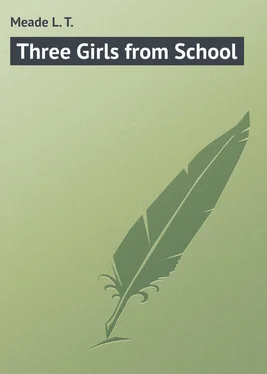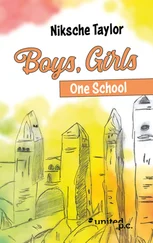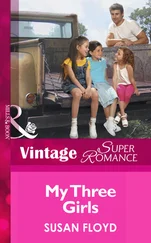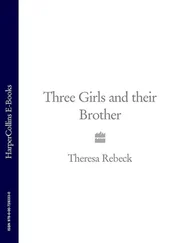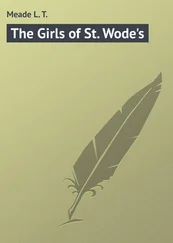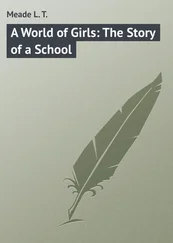L. Meade - Three Girls from School
Здесь есть возможность читать онлайн «L. Meade - Three Girls from School» — ознакомительный отрывок электронной книги совершенно бесплатно, а после прочтения отрывка купить полную версию. В некоторых случаях можно слушать аудио, скачать через торрент в формате fb2 и присутствует краткое содержание. Жанр: foreign_prose, foreign_children, на английском языке. Описание произведения, (предисловие) а так же отзывы посетителей доступны на портале библиотеки ЛибКат.
- Название:Three Girls from School
- Автор:
- Жанр:
- Год:неизвестен
- ISBN:нет данных
- Рейтинг книги:5 / 5. Голосов: 1
-
Избранное:Добавить в избранное
- Отзывы:
-
Ваша оценка:
- 100
- 1
- 2
- 3
- 4
- 5
Three Girls from School: краткое содержание, описание и аннотация
Предлагаем к чтению аннотацию, описание, краткое содержание или предисловие (зависит от того, что написал сам автор книги «Three Girls from School»). Если вы не нашли необходимую информацию о книге — напишите в комментариях, мы постараемся отыскать её.
Three Girls from School — читать онлайн ознакомительный отрывок
Ниже представлен текст книги, разбитый по страницам. Система сохранения места последней прочитанной страницы, позволяет с удобством читать онлайн бесплатно книгу «Three Girls from School», без необходимости каждый раз заново искать на чём Вы остановились. Поставьте закладку, и сможете в любой момент перейти на страницу, на которой закончили чтение.
Интервал:
Закладка:
Meade L. T.
Three Girls from School
Chapter One
Letters
Priscilla Weir, Mabel Lushington, and Annie Brooke were all seated huddled up close together on the same low window-sill. The day was a glorious one in the beginning of July. The window behind the girls was open, and the softest of summer breezes came in and touched their young heads, playing with the tumbled locks of hair of different shades, varying from copper-colour to dark, and then to brightest gold.
Priscilla was the owner of the dark hair; Mabel possessed the copper-colour, Annie Brooke the gold. All three girls looked much about the same age, which might have been anything from sixteen to eighteen. Priscilla was perhaps slightly the youngest of the trio. She had dark-grey, thoughtful eyes; her face was pale, her mouth firm and resolved. It was a sad mouth for so young a girl, but was also capable of much sweetness. Mabel Lushington was made on a big scale. She was already well developed, and the copper in her lovely hair was accompanied by a complexion of peachlike bloom, by coral lips, and red-brown eyes. Those lips of hers were, as a rule, full of laughter. People said of Mabel that she was always either laughing or smiling. She was very much liked in the school, for she was at once good-natured and rich.
Annie Brooke was small. She was the sort of girl who would be described as petite . Her hair was bright and pretty. She had beautiful hands and feet, and light-blue eyes. But she was by no means so striking-looking as Mabel Lushington, or so thoughtful and intellectual as Priscilla Weir.
The post had just come in, and two of the girls had received letters. Priscilla read hers, turned a little paler than her wont, slipped it into her pocket, and sat very still, Mabel, on the contrary, held her unopened letter in her lap, and eagerly began to question Priscilla.
“Whom have you heard from? What is the matter with you? Why don’t you divulge the contents?”
“Yes, do, Priscilla, please,” said Annie Brooke, who was the soul of curiosity. “You know, Priscilla, you never could have secrets from your best friends.”
“I have got to leave school,” said Priscilla; “there is nothing more to be said. My uncle has written; he has made up his mind; he says I am to learn farming.”
“Farming!” cried the other two. “You – a girl!”
“Oh, dairy-work,” said Priscilla, “and the managing of a farm-house generally. If I don’t succeed within six months he will apprentice me, he says, to a dressmaker.”
“Oh, poor Priscilla! But you are a lady.”
“Uncle Josiah doesn’t mind.”
“What an old horror he must be!” said Annie Brooke.
“Yes. Don’t let us talk about it.” Priscilla jumped up, walked across the room, and took a book from its place on the shelf. As she did so she turned and faced her two companions.
The room in which the three found themselves was one of the most beautiful of the many beautiful rooms at Mrs Lyttelton’s school. The house was always called the School-House; and the girls, when asked where they were educated, replied with a certain modest pomposity, “At Mrs Lyttelton’s school.” Those who had been there knew the value of the announcement, for no school in the whole of England produced such girls: so well-bred, so thoroughly educated, so truly taught those things which make for honour, for purity, for a life of good report.
Mrs Lyttelton had a secret known but to a few: how to develop the very best in each girl brought under her influence. She knew how to give liberty with all essential restraints, and how to cultivate ambition without making the said ambition too worldly-minded. She was adored by all the girls, and there were very few who did not shed tears when the time came for them to leave the School-House.
The said School-House was situated in the most lovely part of Middlesex, not very far from Hendon. It was quite in the country, and commanded a splendid view. The house was old, with many gables, quaint old windows, long passages, and innumerable rooms. Each girl over fifteen had a bedroom to herself in Mrs Lyttelton’s school, and each girl over fifteen who deserved the privilege was accorded the entrée to the older girls’ sitting-room. Into this room no teacher was allowed to enter without permission. The room as completely belonged to the girls as though there were no teachers in the school. Here they could give entertainments; here they could conduct debates; here they could lounge and read and chatter and enjoy themselves to their hearts’ delight.
The room wanted for no lack of dainty furnishing. There were cosy nooks in more than one corner; there were easy-chairs galore; and from the low, old-fashioned windows could be seen the most perfect view of the outside world.
Priscilla Weir now turned to look at this view. She had a passionate love for all beautiful things. There was a dimness before her eyes. From the view she glanced at Mabel Lushington; then she looked at Annie Brooke.
Both girls sympathised with her; and yet, not in the way she wanted. She turned abruptly and left the room.
When the door closed behind her Mabel immediately rose, and as she did so the unopened letter tumbled from her lap. Annie Brooke took it up and handed it to her.
“How upset she is!” said Annie.
“Oh yes,” replied Mabel; “but I only wish I were in her shoes. Oh, I know, of course, Annie, it is jolly here, and Mrs Lyttelton is a darling; but I want to get into the big world I shall be eighteen in a month, and it seems absurd to keep any girl at school after that age. Aunt Henrietta is in Paris, too, and is going, I believe, to one of the German spas by-and-by for gout treatment. Aunt Henrietta spends the entire year in a round of gaieties. I’d just give the world to join her.”
“And why don’t you?” asked Annie. “A great many girls leave school at eighteen.”
“She seems determined that I shall stay on for at least another year. It is quite nonsense. She seems to think I am not clever enough to leave school.”
“Well, you are not specially brilliant, are you, dear Lushie?” asked Annie in that soft little voice of hers, which could nevertheless be intensely aggravating. “Now, for instance, prize day is close at hand – the day after to-morrow, no less – and what prize is the fair Mabel likely to carry off?”
“I don’t care twopence for prizes,” was Mabel’s reply; “and I don’t specially want to be clever, if I can be beautiful. You think I am beautiful, don’t you, Annie?”
“Oh, my dear, of course there is no denying that,” said Annie. She looked up with admiration at her friend, and Mabel at that moment, with an added colour in her cheeks and displaying all the charm of her lovely figure, seemed to justify the remark.
“Why don’t you read your letter?” said Annie.
“Oh, it is only from Aunt Henrietta, and she does worry me so by the sort of lecturing tone she has taken up of late. She is a dear, good old thing – not so very old, either – at least she doesn’t think so; but when I know how she fritters her time and just lives for pleasure, and pleasure only, it is aggravating to be told that I must be earnest and embrace my opportunities, and endeavour to become really well informed; and that, of course, I must on no account hurry from school, for school-time is the best time; and all that sort of nonsense. You understand, don’t you, Annie?”
“Yes,” said Annie in a low voice, and with a sigh, “I quite understand. I have had a great deal of that myself. Uncle Horace lectures me awfully. I hate being lectured. Don’t you?”
“Loathe and detest it,” said Mabel.
“My plan,” said Annie, “is to shut my ears; then the lectures don’t seem to matter much. Do you know how to manage that?”
Читать дальшеИнтервал:
Закладка:
Похожие книги на «Three Girls from School»
Представляем Вашему вниманию похожие книги на «Three Girls from School» списком для выбора. Мы отобрали схожую по названию и смыслу литературу в надежде предоставить читателям больше вариантов отыскать новые, интересные, ещё непрочитанные произведения.
Обсуждение, отзывы о книге «Three Girls from School» и просто собственные мнения читателей. Оставьте ваши комментарии, напишите, что Вы думаете о произведении, его смысле или главных героях. Укажите что конкретно понравилось, а что нет, и почему Вы так считаете.
